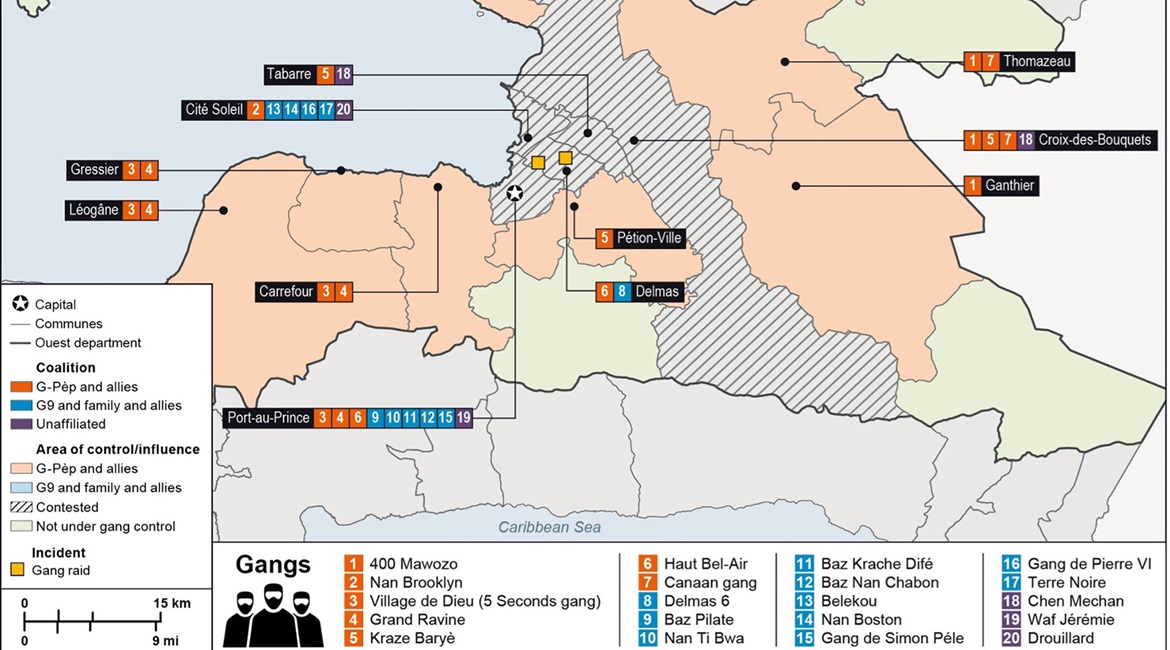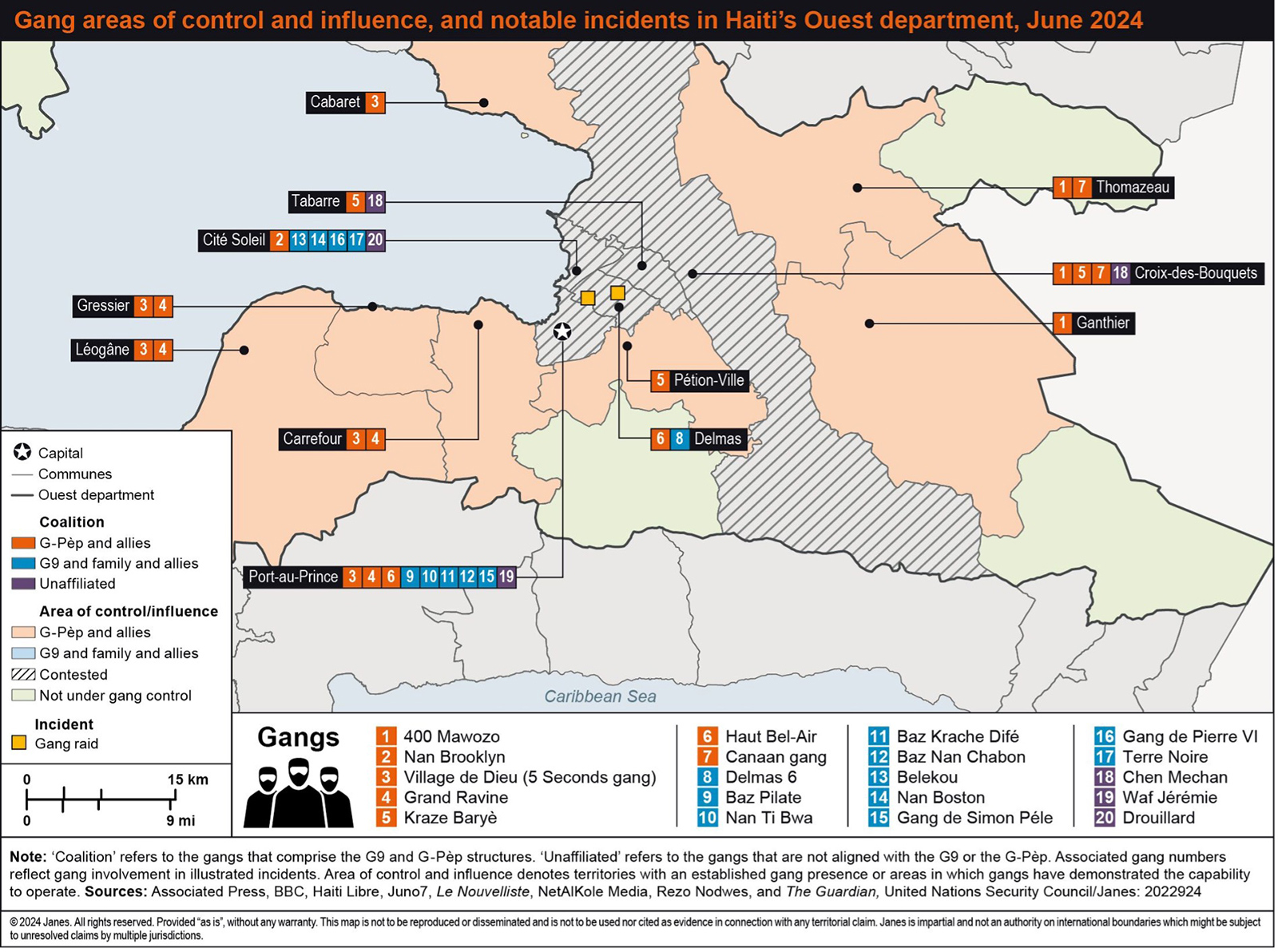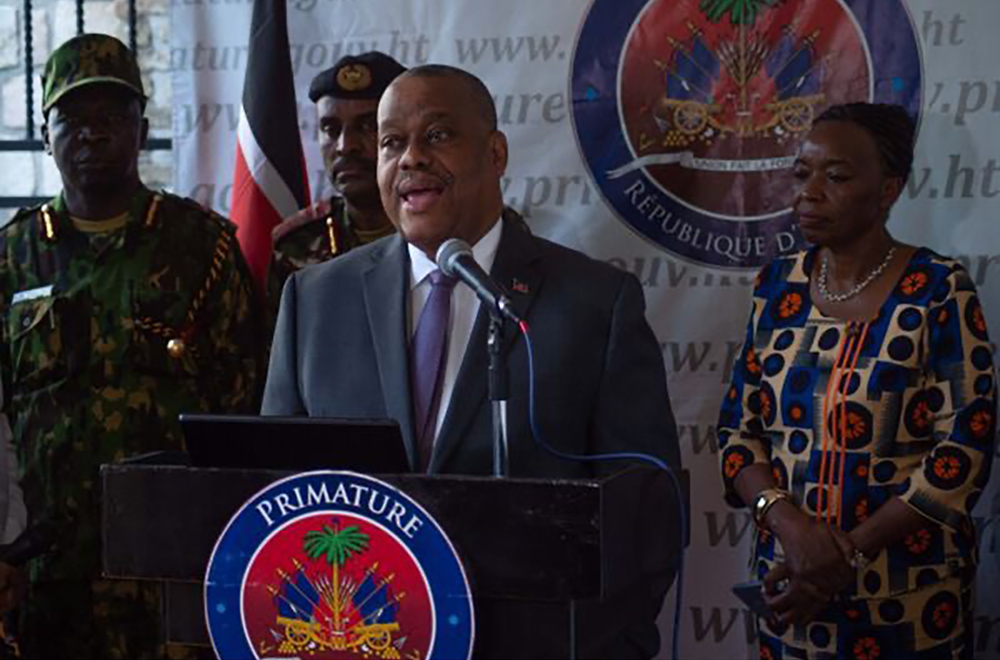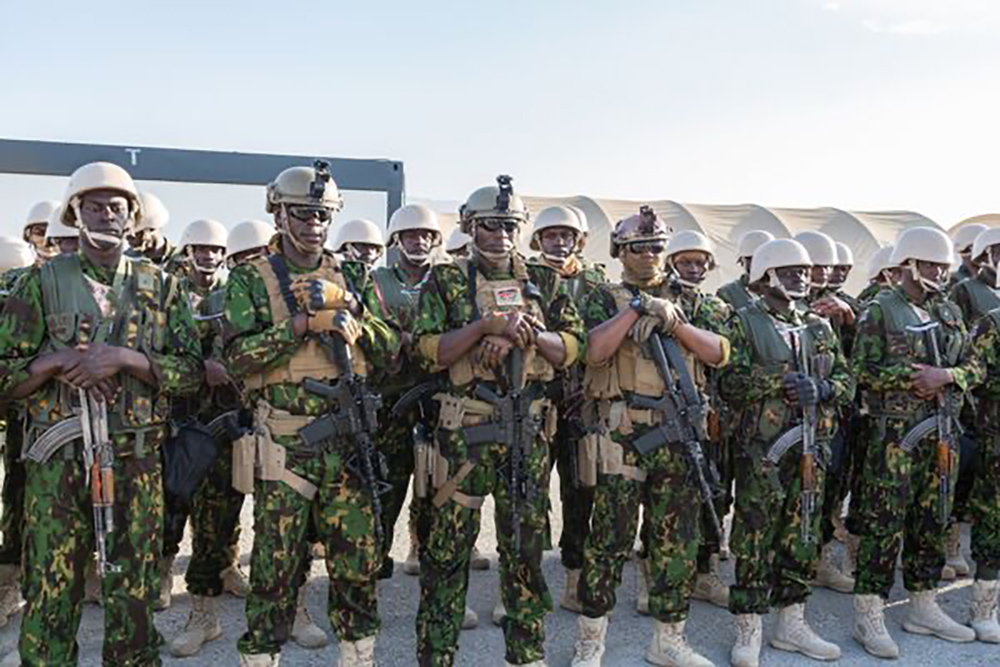
Date Posted: 28-Jun-2024
Author: Lewis Galvin, London, UK
The Kenyan-led MSSM deployed to Haiti's capital Port-au-Prince on 25 June. Janes Americas analyst Lewis Galvin analyses the mission's short-term prospects and gang preparations throughout June
Key points
- Janes recorded a significant reduction in gang raids and attacks on infrastructure in June compared with May
- The reduction in violence likely indicated that gangs had prioritised consolidating control of their established territories rather than expending resources on territorial expansion ahead of the 25 June MSSM deployment
- The MSSM is unlikely to have a significant impact immediately due to the limited number of personnel being deployed
Key events
 Gang areas of control and influence, and notable incidents in Haiti's Ouest department, June 2024. (Associated Press, BBC, Haiti Libre, Juno7, Le Nouvelliste, NetAlKole Media, Rezo Nodwes, and The Guardian, United Nations Security Council/Janes)
Gang areas of control and influence, and notable incidents in Haiti's Ouest department, June 2024. (Associated Press, BBC, Haiti Libre, Juno7, Le Nouvelliste, NetAlKole Media, Rezo Nodwes, and The Guardian, United Nations Security Council/Janes)
Janes recorded a notable reduction in gang violence in June compared with May, from 16 incidents to two. Janes assesses the decrease was likely because of gangs preparing for the United Nations (UN)-authorised Multinational Security Support Mission (MSSM) 25 June deployment.
Janes assesses that controlling the Delmas commune became a high priority for gangs between April and June, particularly for G9 leader Jimmy Chérizier's (alias Barbecue) Delmas 6 gang, after repeated attacks on civilian communities during this period.
Gang members killed three officers of the Temporary Anti-Gang Unit (Unité Temporaire Anti-Gang: UTAG) – a specialised branch of the Haitian National Police (Police Nationale d'Haïti: PNH) – during an operation in the Delmas 18 neighbourhood on 9 June. Delmas 18 is under Barbecue's control. Haitian newspaper Le Nouvelliste reported on 10 June that Barbecue had claimed responsibility for the attack on social media, although Janes was unable to verify the claim. Le Nouvelliste added that gang members had dug a trench to incapacitate PNH armoured vehicles before killing the personnel.
At least 10 civilians were killed by unidentified gang members in the Delmas 24 neighbourhood on 11 June. Haitian media agency Juno7 reported on the following day that the gang members ambushed civilians – returning home after having previously fled violence in the area – once an accompanying PNH vehicle had left the neighbourhood.
Barbecue posted a video online on 13 June warning the PNH to stop conducting anti-gang operations in Delmas or risk provoking gangs into attacking civilians. Haiti Libre cited the video on 14 June and said Barbecue had threatened the “businesses of the economic elite located around the city from Delmas to Port-au-Prince”, with Barbecue warning that “it is likely that in the coming days there will be major clashes at the bottom of Delmas”.
On 16 June gang members killed four civilians in the Delmas 33 neighbourhood. NetAlKole Media reported the following day that the perpetrators had worn PNH uniforms and posed as police officers during the attack. Gang members have increasingly posed as PNH officers to conduct attacks on civilians between 2023 and 2024.
On 24 June Le Nouvelliste reported that Barbecue had posted a video to social media calling for Prime Minister Garry Conille to engage in dialogue with gangs to resolve Haiti's security crisis. Janes was unable to independently verify the video, but Barbecue's purported willingness to negotiate with the government indicates a change in gang strategy, after Barbecue publicly declared in May that Haiti's armed groups would violently oppose the MSSM and would consider Kenyan forces to be invaders and aggressors.
Gang tactics
On 15 June Haiti Libre reported that gangs are “increasing the number of traps serving as ambushes” in their areas of control, including digging pits covered with planks and paving stones, which appears similar to the 9 June attack in Delmas. Janes was unable to independently verify the claims.
Haiti Libre cited the International Observatory for Democracy and Governance (Observatoire International de la Démocratie et de la Gouvernance: OIDG) on 24 June identifying a change in gang strategy. The OIDG highlighted that gang members were beginning to disperse from Port-au-Prince and “assimilating with local populations” in provincial towns such as Gressier with the intention “to create human shields to protect themselves from the MSSM”. Any such movement is likely to be a short-term phenomenon rather than the permanent displacement of gang members.
 Haitian Prime Minister Garry Conille speaks to the press, next to Kenyan National Security Advisor Monica Juma (right), during a press conference in Port-au-Prince on 25 June 2024. (Clarens Siffroy/AFP via Getty Images)
Haitian Prime Minister Garry Conille speaks to the press, next to Kenyan National Security Advisor Monica Juma (right), during a press conference in Port-au-Prince on 25 June 2024. (Clarens Siffroy/AFP via Getty Images)
Political developments
Conille was voted into office by six of the seven Transitional Presidential Council (Conseil Présidentiel de Transition: CPT) members in late May, before being inaugurated on 3 June. The only member who did not vote for Conille was Laurent St Cyr, although council member Louis Gérald Gilles told the Associated Press on 29 May that St Cyr was overseas at the time of the vote. Conille had previously served as prime minister under President Michel Martelly between 2011 and 2012 before becoming the regional director for the UN Children's Fund (UNICEF). Conille's new cabinet was sworn in on 12 June 2024.
International response
On 25 June the first contingent of 400 Kenyan police officers were deployed to Haiti as part of the MSSM. Le Nouvelliste reported on 24 June that the contingent comprises officers from the General Service Unit's (GSU's) Recce Squad, the Anti-Stock Theft Unit, the Border Patrol Unit, and the Rapid Deployment Unit. On 25 June Reuters reported that a second contingent of 600 Kenyan officers was scheduled to be deployed at an unspecified later date. Janes analysts identified that the Kenyan officers photographed on arrival in Port-au-Prince were armed with AK-pattern assault rifles, indicating that this will be the primary firearm used by the Kenyan contingent.

Members of the first contingent of Kenyan police officers undergo training as Conille visits the Kenyan police contingent with his government, members of the Kenyan delegation, and the high command of the Haitian National Police (PNH) at their bases in Port-au-Prince, Haiti, on 26 June 2024. (Guerinault Louis/Andalou via Getty Images)


